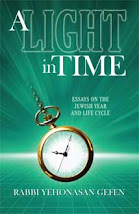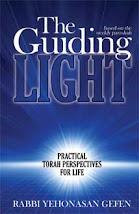“Who is the man who is fearful and faint-hearted? Let him go and return to his house, and let him not melt the heart of his fellows to be like his heart.” The Torah commands anyone who is afraid of going to war to leave the battlefield because of the negative influence his behaviour will have on his fellow soldiers. They will be effected by his fear and consequently become more fearful themselves which will have a detrimental session . The Ramban brings the opinion of the Behag that this is one of the 613 mitzvos. Rav Chaim Shmuelevitz zt”l says that the shoresh of this mitzvo is that it is forbidden to act in such a way in any area of life that will negatively influence onlookers. This applies even if the action is justified but can still be interpreted in a negative way - thus he warns of the care a ben yeshiva must take in not missing seder, even when he has a valid reason, because everyone else may not know of this reason and will come to learn to be less makpid in keeping to their own seder. Rav Shlomo-Zalman Auerbach zt”l applied this principle in halacho. He was asked by someone who had a choice of two Shacharis minyanim; one was far slower than the other, allowing for more kavanna, but if he would daven in it he would have to leave before the end. Rav Auerbach answered that he should daven in the slower minyan even though he would have to leave early. However, he told the person that he should make known the reason for his early departure so as to avoid a possible chillul Hashem. Even though the shoel was following the halacho by leaving early, nevertheless he had to be aware of the possible consequences that this could have on others.
One may ask, why should a person be judged by how his actions influence others if there is nothing intrinsically wrong with them - we are commanded to keep the 613 mitzvos; if a person does that then why should he suffer from others imitating him in a negative way? Rav Chaim of Volozhin zt”l writes that in the Shemoneh Esrei of Rosh Hashana we say that Hashem judges the “maaseh ish upekudaso”. Maaseh ish means a person’s own actions, but what does ‘pekudaso’ refer to? He explains that each person has a sphere of influence beyond himself, which includes his family, his students, and any people that come into contact with him. The way he influences these people through his own actions is ‘pekudaso’ and he is judged in that area as well. If, by observing his behaviour, they learn to improve their avodas Hashem then he will receive much reward but if the opposite occurs then he will be judged for his part in their aveiros just as he is judged for his own. A person’s actions do not take place in a vacuum, we are always being noticed by others, consequently we must constantly be aware of the possible effect we can have on others without even directly communicating with them.
This idea is demonstrated in the following story told by Rav Dovid Kaplan Shlita: “Pesach the shoemaker died and went before the beis din shel maalah. He saw a massive pair of scales in front of him and a deep voice called out, ‘Bring in the mitzvos!” Angels dressed in white brought in several big bags stuffed with mitzvos. They poured them onto the scale, and the side of zechus went down, bringing a big smile to Pesach’s face. A voice then said, ‘bring in the aveiros!’ A couple of trucks full of black, gruesome-looking angels came in and began pouring the aveiros on the other side of the scale. The smile quickly faded from Pesach’s face. In the middle of the procedure he noticed something odd. ‘Wait, wait,’ he cried, ‘some of those aveiros are not mine. I never did that, that or that.’ ‘No,’ responded the beis din shel maalah, ’indeed you did not. Those are the aveiros of people who watched what you did and learned from your actions. You are responsible for their deeds. When you spoke in shul, Velvel saw you speaking and therefore thought it was okay to speak - you get his aveiro. When you left shul early and Chaim the shtreimel maker thought he could leave early as well, you are responsible for that misdeed, too. When you spoke lashon hara and those around you thought it okay to listen because it was you who was talking, you carry the responsibility as well…”
Thankfully, we can also benefit from this form of din through the positive effect we can have on our fellow: One way in which to do this is by being a positive example in our own behaviour and thereby inspire those around us to emulate us. Rav Aron Kotler zt”l notes that b’zman hazeh it is very difficult to rebuke someone effectively without embarrassing him. He suggests that one way to help him grow without fear of causing pain is rebuke by example; acting in such a way that inspires others to emulate his behaviour. A yeshiva bachur who, for example consistently arrives on time for Shacharis can influence his roommates to want to do the same; a baal habayis who is makpid to be kovaya itim letorah is an example to those who can’t find the time to learn regularly. Or a person who is careful not to speak lashon hara makes it difficult for those around him to do so by his mere presence. Rav Kotler is mechadesh that if a person deliberately excels in a certain area of avodas Hashem in order to effect onlookers, then he has fulfilled the mitzvo of tochacha. And the greater a person is, the more he can influence others in this way. A resolution to bring all of Jewry back to the Torah was found in the satchel of the great baal mussar, Rav Naftali Amsterdam zt”l. When asked how he planned to carry out this resolution, he replied, “I have resolved to keep all the laws of the Shulchan Aruch strictly. In this way I will serve as a living Shulchan Aruch and anyone who wants to keep the Torah will be able to see in me a living example of a complete Jew and learn from me how to return to the Torah.”
Rav Shmuelevitz goes so far as to argue that causing others to fulfil a mitzvo is considered greater than doing the mitzvo oneself. One of his proofs is a Gemara in Sotah: The Gemara says that Yehuda’s body did not find rest until Moshe Rabbeinu prayed for him and mentioned one of his merits; Moshe said to Hashem, “who caused Reuven to confess to his sin [of moving his father’s bed]? Yehuda [when he confessed about the maaseh Tamar].” Rav Shmuelevitz points out that the only zechus that Moshe mentioned in his tefilla is that Yehuda caused Reuven to confess. Why didn’t he mention the great merit of Yehuda’s own confession, an act of great courage that saved the lives of three souls?! We are forced to answer that being mezakeh our fellow is greater than our own deed in and of itself and therefore the effect his deed had on Reuven was greater than the deed itself!
A person can never know when his deeds can influence others, even the smallest actions can have great effect as is demonstrated in the following true stories: Expecting a large crowd in shul on Yom Kippur, the tzaddik, Rav Elya Dushnitzer occupied himself by tearing pieces o toilet paper for public use in the large Petach Tikva shul’s bathroom. A secular Israeli stopped to watch what appeared to him as somewhat peculiar. “Why are you doing that,” he asked. “Tomorrow there is going to be a big crowd, and I don’t want anyone to be inconvenienced.” After becoming a baal teshuva, the Israeli explained what moved him to make a life change. “It was that rabbi. Every rip of paper made a tear deep in my heart.”
Unsure of whether to attend yeshiva full-time or to pursue a regular career, young Moshe decided to go to a yeshiva and see what the guys were like. As he was walking through the lunchroom, a bachur bumped into him, causing Moshe to spill his coffee on another boy seated at a table. Without a moment’s hesitation, the boy jumped up and called out, “Hey, Shimon, quickly bring another cup of coffee for Moshe!” Moshe decided that if this is what yeshiva bachurim are like, then he’s going to stay. He went on to become Rav Moshe Shwab, the mashgiach of Gateshead Yeshiva.
The people in these stories who were the catalyst for the great changes people made in their lives, do not merely gain reward for their single action. The Mishna in Avos writes that a person who is mezakeh others receives incredible benefits; It begins by saying that ‘sin will not come to his hand,’ - many commentators explain this to mean that he will receive great siyata dishmaya to avoid sin. The Mishna then describes Moshe Rabbeinu as an example of a mezakeh d’rabim and says that he receives reward for all the mitzvos that he caused to be done as if he fulfilled them himself. Thus, Rav Aaron Kotler notes that one who is mezakeh others with mitzvos receives incredible reward for his deeds. “one can not imagine the great gain a person receives through this; he is zocheh to extra heavenly protection to not stumble in sin and also to a great number of merits, something which would have been impossible for him to achieve through his own bechira. He writes further that this can help us in din; The Gemara says that the Sifrey Chaim and Sifsey Meisim are opened on Rosh Hashana. Tosefos explains that the dead are also judged. For what are they judged? Rav Kotler answers that even after a person’s death, the actions he committed in the world can still effect others , both positively or negatively. Thus, if a person helps others in such a way that the benefits are long-lasting, he can continue to reap the reward for this even after his own death. May we all be zocheh to the favourable din of the mezakeh harabim.


